- Home
- Patricia Cornwell
The Last Precinct ks-11
The Last Precinct ks-11 Read online
The Last Precinct
( Kay Scarpetta - 11 )
Patricia Cornwell
Patricia Cornwell
The Last Precinct
A Kay Scarpetta Mystery
Prologue:
After The Fact
THE COLD DUSK GIVES UP ITS BRUISED COLOR TO complete darkness, and I am grateful that the draperies in my bedroom are heavy enough to absorb even the faintest hint of my silhouette as I move about packing my bags. Life could not be more abnormal than it is right now.
"I want a drink," I announce as I open a dresser drawer. "I want to build a fire and have a drink and make pasta. Yellow and green broad noodles, sweet peppers, sausage. Le pappare-delle del cantunzein. I've always wanted to take a sabbatical, go to Italy, learn Italian, really learn it. Speak it. Not just know the names of food. Or maybe France. I will go to France. Maybe I'll go there right this minute," I add with a double edge of helplessness and rage. "I could live in Paris. Easily." It is my way of rejecting Virginia and everybody in it.
Richmond Police Captain Pete Marino dominates my bedroom like a thick lighthouse, his giant hands shoved into the pockets of his jeans. He doesn't offer to help me pack the suit bag and tote bags laid open on the bed, knowing me well enough to not even think about it. Marino may look like a red-
neck, talk like a redneck, act like a redneck, but he is as smart as hell, sensitive and very perceptive. This very moment, for example, he realizes a simple fact: Not even twenty-four hours ago, a man named Jean-Baptiste Chandonne tracked through snow beneath a full moon and tricked his way into my house. I was already intimately familiar with Chandonne's modus operandi, so I can safely project what he would have done to me given the chance. But I haven't quite been able to subject myself to anatomically correct images of my own mauled dead body, and nobody could more accurately describe such a thing than I. I am a forensic pathologist with a law degree, the chief medical examiner of Virginia. I autop-sied the two women Chandonne recently killed here in Richmond and reviewed the cases of seven others he murdered in Paris.
Safer for me to say what he did to those victims, which was to savagely beat them, to bite their breasts, hands and feet, and to play with their blood. He doesn't always use the same weapon. Last night, he was armed with a chipping hammer, a peculiar tool used in masonry. It looks very much like a pickaxe. I know for a fact what a chipping hammer can do to a human body because Chandonne used a chipping hammer_the same one, I presume_on Diane Bray, his second Richmond victim, the policewoman he murdered two days ago, on Thursday.
"What day is it?" I ask Captain Marino. "Saturday, isn't it?"
"Yeah. Saturday."
"December eighteenth. One week before Christmas. Happy holidays." I unzip a side pocket of the suit bag.
"Yeah, December eighteenth."
He watches me as if I am someone who might spring into irrationality any second, his bloodshot eyes reflecting a wariness that pervades my house. Distrust is palpable in the air. I taste it like dust. I smell it like ozone. I feel it like dampness. The wet swishing of tires on the street, the discord of feet, of voices and radio chatter are a disharmony from hell as law enforcement continues its occupation of my property. I am violated. Every inch of my home is exposed, every facet of my life is laid bare. I may as well be a naked body on one of my own steel tables in the morgue. So Marino knows not to ask if he can help me pack. Oh yes, he sure as hell knows he better dare not even think about touching a damn thing, not a shoe, not a sock, not a hairbrush, not a bottle of shampoo, not the smallest item. Police have asked me to leave the sturdy stone house of dreams I built in my quiet, gated West End neighborhood. Imagine that. I am quite certain Jean-Baptiste Chandonne_Le Loup-Garou or The Werewolf, as he calls himself_is getting better treatment than I am. The law provides people like him with every human right conceivable: comfort, confidentiality, free room, free food and drink, and free medical care in the forensic ward of the Medical College of Virginia, where I am a member of the faculty.
Marino hasn't bathed or been to bed in at least twenty-four hours. When I move past him, I smell Chandonne's hideous body odor and am stabbed by nausea, a burning wrenching of my stomach that locks my brain and causes me to break out in a cold sweat. I straighten up and take a deep breath to dispel the olfactory hallucination as my attention is drawn beyond the windows to the slowing of a car. I have come to recognize the subtlest pause in traffic and know when it will become someone parking out front. It is a rhythm I have listened to for hours. People gawk. Neighbors rubberneck and stop in the middle of the road. I reel in an uncanny intoxication of emotions, one minute bewildered and then frightened the next. I swing from exhaustion to mania, from depression to tranquil-ity, and beneath it all, excitement fizzes as if my blood is filled with gas.
A car door shuts out front. "Now what?" I complain. "Who this time? The FBI?" I open another drawer. "Marino, that's it." I gesture with a fuck-you wave of my hands. "Get them out of my house, all of them. Now." Fury shimmers like mirages on hot blacktop. "So I can finish packing and get the hell out of here. Can't they just leave long enough for me to get out?" My hands shake as I pick through socks. "It's bad enough they're in my yard." I toss a pair of socks in the tote bag. "It's bad enough they're here at all." Another pair. "They can come back when I leave." And I throw another pair and miss, and stoop over to pick it up. "They can at least let me walk through my own house." Another pair. "And let me get out in peace and privacy." I put a pair back in the drawer. "Why the hell are they in my kitchen?" I change my mind and get out the socks I just put back. "Why are they in my study? I told them he didn't go in there."
"We gotta look around, Doc," is what Marino has to say about it.
He sits down on the foot of my bed, and that is wrong, too. I want to tell him to get off my bed and out of my room. It is all I can do not to order him out of my house and possibly out of my life. It doesn't matter how long I have known him or how much we have been through together.
"How's the elbow, Doc?" He indicates the cast that immobilizes my left arm like a stovepipe.
"It's fractured. It hurts like hell." I shut the drawer too hard.
'Taking your medicine?"
"I'll survive."
He watches my every move. "You need to be taking that stuff they gave you."
We have suddenly reversed roles. I act like the rude cop while he is logical and calm like the lawyer-physician I am supposed to be. I walk back into the cedar-lined closet and begin gathering blouses and laying them in the suit bag, making sure top buttons are buttoned, smoothing silk and polished cotton with my right hand. My left elbow throbs like a toothache, my flesh sweating and itching inside plaster. I spent most of the day in the hospital_not that getting a cast put on a fractured limb is a lengthy procedure, but doctors insisted on checking me very carefully to make sure I didn't have other injuries. I repeatedly explained that when I fled from my house, I fell down my front steps and fractured my elbow, nothing more. Jean-Baptiste Chandonne never had a chance to touch me. I got away and am okay, I kept saying during X ray after X ray. Hospital staff held me for observation until late afternoon and detectives were in and out of the examination room. They took my clothes. My niece, Lucy, had to bring me something to wear. I have had no sleep.
The telephone pierces the air like a foil. I pick up the extension by the bed. "Dr. Scarpetta," I announce into the handset, and my own voice saying my name reminds me of calls in the middle of the night when I answer my phone and some detective gives me very bad news about a death scene somewhere. Hearing my usual businesslike self-announcement triggers the image I have so far evaded: my savaged body on my bed, blood spattered all over the room, this room, and my assistant chief medic
al examiner getting the call and the look on his face as police_probably Marino_tell him I have been murdered and someone, God knows who, needs to respond to the scene. It occurs to me that no one from my office could possibly respond. I have helped Virginia design the best disaster plan of any state in the country. We can handle a major airline crash or a bombing in the coliseum or a flood, but what would we do if something happened to me? Bring in a forensic pathologist from a nearby jurisdiction, maybe Washington, I suppose. Problem is, I know almost every forensic pathologist on the East Coast and would feel terribly sorry for whoever had to deal with my dead body. It is very difficult working a case when you are acquainted with the victim. These thoughts fly through my mind like startled birds as Lucy asks me over the phone if I need anything, and I assure her I am fine, which is perfectly ridiculous.
"Well, you can't be fine," she replies.
"Packing," I tell her what I am doing. "Marino's with me and I'm packing," I repeat myself as my eyes fix on Marino in a frozen way. His attention wanders around and it seeps into my awareness that he has never been inside my bedroom. I don't want to imagine his fantasies. I have known him for many years and have always been aware that his respect for me is potently laced with insecurity and sexual attraction. He is a hulk of a man with a swollen beer belly, and a big disgruntled face, and his hair is colorless and has unattractively
migrated from his head to other parts of his body. I listen to
my niece on the phone as Marino's eyes feel their way around my private spaces: my dressers, my closet, the open drawers, what I am packing and my breasts. When Lucy brought tennis shoes, socks and a warm-up suit to the hospital, she didn't think to include a bra, and the best I could do when I got here was to cover up with an old, voluminous lab coat that I wear like a smock when I do odd jobs around the house.
"I guess they don't want you in there, either," Lucy's voice sounds over the line.
It is a long story, but my niece is an agent with the Bureau of Alcohol, Tobacco and Firearms, and when the police responded, they couldn't exile her from my property fast enough. Maybe a little knowledge is a dangerous thing and they feared a big-shot federal agent would insert herself into the investigation. I don't know, but she is feeling guilty because she wasn't here for me last night and I almost got murdered, and now she isn't here for me again. I make it clear I don't blame her in the least. I also can't stop wondering how different my life would be had she been home with me when Chandonne showed up_instead of out taking care of a girlfriend. Maybe Chandonne would have known I wasn't alone and would have stayed away, or he would have been surprised by another person in the house and would have fled, or he would have put off murdering me until tomorrow or the next night or Christmas or the new millennium.
I pace as I listen to Lucy's breathless explanations and comments over the cordless phone and catch my reflection as I go past the full-length mirror. My short blond hair is wild, my blue eyes glassy and puckered with exhaustion and stress, my brow gathered in what is a mixture of a frown and near-tears. The lab coat is dingy and stained and not the least bit chiefly. I am very pale. The craving for a drink and a cigarette are atypically strong, almost unbearable, as if almost being murdered has turned me into an instant junkie. I imagine being alone in my own home. Nothing has happened. I am enjoying a fire, a cigarette, a glass of French wine, maybe a
Bordeaux because Bordeaux is less complicated than Burgundy. Bordeaux is like a fine old friend you don't have to figure out. I dispel the fantasy with fact: It doesn't matter what Lucy did or didn't do. Chandonne would have come to murder me eventually, and I feel as if a terrible judgment has been waiting for me all of my life, marking my door like the Angel of Death. Bizarrely, I am still here.
Chapter 1
I KNOW FROM LUCY'S VOICE THAT SHE IS SCARED. Rarely is my brilliant, forceful, helicopter-piloting, fitness-obsessed, federal-law-enforcement-agent niece scared.
"I feel really bad," she continues to repeat herself over the phone as Marino maintains his position on my bed and I pace.
"You shouldn't," I tell her. "The police don't want anybody here, and believe me, you don't want to be here. I guess you're staying with Jo and that's good." I say this to her as if it makes no difference to me, as if it doesn't bother me that she is not here and I haven't seen her all day. It does make a difference. It does bother me. But it is my old habit to give people an out. I don't like to be rejected, especially by Lucy Farinelli, whom I have raised like a daughter.
She hesitates before answering. "Actually, I'm downtown at the Jefferson."
I try to make sense of this. The Jefferson is the grandest hotel in the city, and I don't know why she would go to a hotel at all, much less an elegant, expensive one. Tears sting my
eyes and I force them back, clearing my throat, shoving down
hurt. "Oh," is all I say. "Well, that's good. I guess Jo's with you at the hotel, then."
"No, with her family. Look, I just checked in. I've got a room for you. Why don't I come get you?"
"A hotel's probably not a good idea right now." She thought of me and wants me with her. I feel a little better. "Anna's asked me to stay with her. In light of everything, I think it's best for me to go on to her house. She's invited you, too. But I guess you're settled."
"How did Anna know?" Lucy inquires. "She hear about it on the news?"
Since the attempt on my life happened at a very late hour, it won't be in the newspapers until tomorrow morning. But I expect there has been a storm of news breaks over the radio and on television. I don't know how Anna knew, now that I think about it. Lucy says she needs to stay put but will try to drop by later tonight. We hang up.
"The media finds out you're in a hotel, that's all you need. They'll be behind every bush," Marino says with a hard frown, looking like hell. "Where's Lucy staying?"
I repeat what she told me and almost wish I hadn't talked to her. All it did was make me feel worse. Trapped, I feel trapped, as if I am inside a diving bell a thousand feet under the sea, detached, light-headed, the world beyond me suddenly unrecognizable and surreal. I am numb yet every nerve is on fire.
"The Jefferson?" Marino is saying. "You gotta be kidding! She win the lottery or something? She not worried about the media finding her, too? What the shit's gotten into her?"
I resume packing. I can't answer his questions. I am so tired of questions.
"And she ain't at Jo's house. Huh," he goes on, "that's interesting. Huh. Never thought that would last." He yawns loudly and rubs his thick-featured, stubbly face as he watches me drape suits over a chair, continuing to pick out clothes for the office. To give Marino credit, he has tried to be even-tempered, even considerate, since I got home from the hospital. Decent behavior is difficult for him given the best of
circumstances, which certainly are not the ones he finds himself in at present. He is strung out, sleep-deprived and fueled by caffeine and junk food, and I won't allow him to smoke inside my house. It was simply a matter of time before his self-control began to erode and he stepped back into his rude, big-mouthed character. I witness the metamorphosis and am strangely relieved by it. I am desperate for things familiar, no matter how unpleasant. Marino starts talking about what Lucy did last night when she pulled up in front of the house and discovered Jean-Baptiste Chandonne and me in my snowy front yard.
"Hey, it's not that I blame her for wanting to blow the squirrel's brains out," Marino gives me his commentary. "But that's where your training's got to come in. Don't matter if it's your aunt or your kid involved, you got to do what you're trained to do, and she didn't. She sure as hell didn't. What she did was go ape-shit."
"I've seen you go ape-shit a few times in your life," I remind him.
"Well, it's my personal opinion they never should have thrown her into that undercover work down there in Miami." Lucy is assigned to the Miami field office and is here for the holidays, among other reasons. "Sometimes people get too close to the bad guys and start identifying with
them. Lucy's in a kill mode. She's gotten trigger-happy, Doc."
"That's not fair." I realize I have packed too many pairs of shoes. "Tell me what you would have done if you'd gotten to my house first instead of her." I stop what I am doing and look at him.
"At least take a nanosecond to assess the situation before I went in there and put a gun to the asshole's head. Shit. The guy was so fucked up he couldn't even see what he was doing. He's screaming bloody murder because he's got this chemical shit you threw in his eyes. He wasn't armed by this point. He wasn't going to be hurting nobody. That was obvious right away. And it was obvious you was hurt, too. So if it had been me, I'd called for an ambulance, and Lucy didn't think to even do that. She's a wild card, Doc. And no, I didn't want her in the house with all this going on. That's why we interviewed her down at the station, got her statements in a neutral place to get her calmed down."
"I don't consider an interrogation room a neutral place," I reply.
"Well, being inside the house where your Aunt Kay almost got whacked ain't exactly neutral, either."
I don't disagree with him, but sarcasm is poisoning his tone. I begin to resent it.
"All the same, I got to tell you I've got a really bad feeling about her being alone in a hotel right now," he adds, rubbing his face again, and no matter what he says to the contrary, he thinks the world of my niece and would do anything for her. He has known her since she was ten, and he introduced her to trucks and big engines and guns and all sorts of so-called manly interests that he now criticizes her for having in her life. "I might just check on the little shit after I drop you off at Anna's. Not that anybody seems to care about my bad feelings," he jumps back several thoughts. "Like Jay Talley. Of course, it ain't my business. The self-centered bastard."

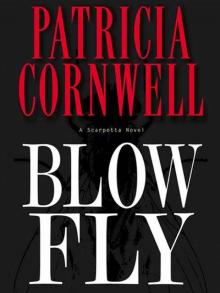 Blow Fly
Blow Fly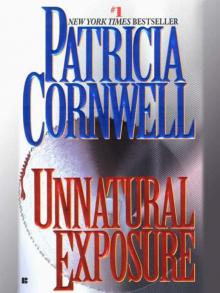 Unnatural Exposure
Unnatural Exposure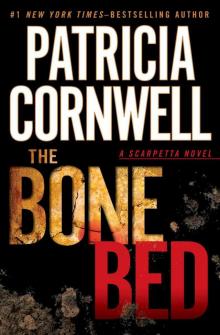 The Bone Bed
The Bone Bed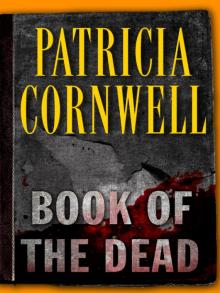 Book of the Dead
Book of the Dead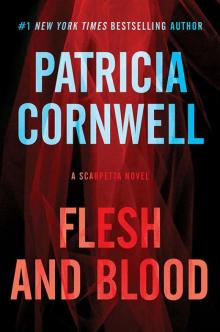 Flesh and Blood: A Scarpetta Novel (Scarpetta Novels Book 22)
Flesh and Blood: A Scarpetta Novel (Scarpetta Novels Book 22)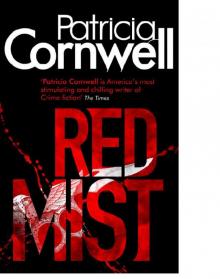 Red Mist
Red Mist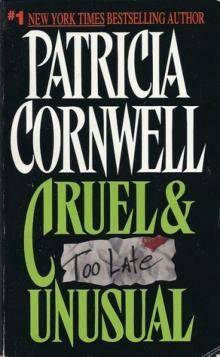 Cruel & Unusual
Cruel & Unusual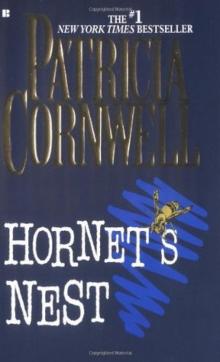 Hornet's Nest
Hornet's Nest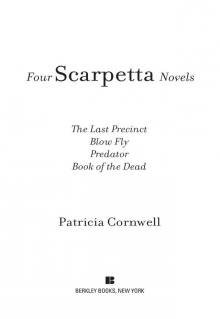 Four Scarpetta Novels
Four Scarpetta Novels Scarpetta's Winter Table
Scarpetta's Winter Table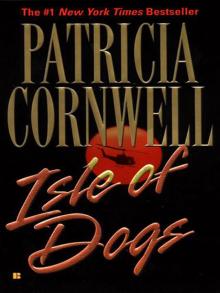 Isle of Dogs
Isle of Dogs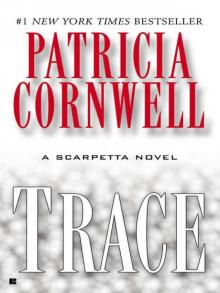 Trace
Trace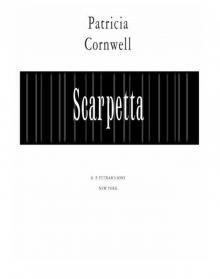 Postmortem
Postmortem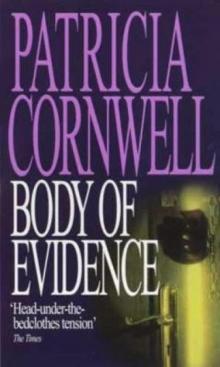 Body of Evidence ks-2
Body of Evidence ks-2 Southern Cross
Southern Cross All That Remains
All That Remains Point of Origin
Point of Origin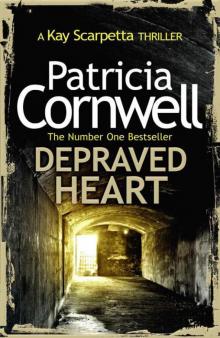 Depraved Heart
Depraved Heart Ruth, a Portrait: The Story of Ruth Bell Graham
Ruth, a Portrait: The Story of Ruth Bell Graham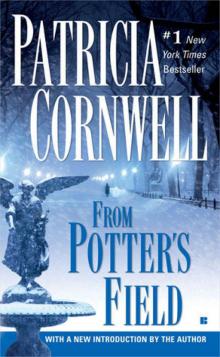 From Potter's Field
From Potter's Field Flesh and Blood
Flesh and Blood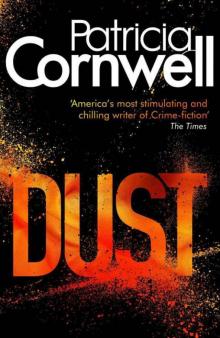 Dust
Dust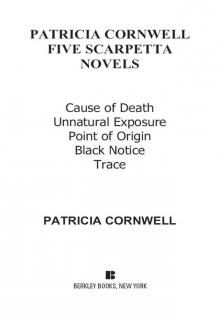 The Body Farm
The Body Farm Port Mortuary
Port Mortuary Quantum
Quantum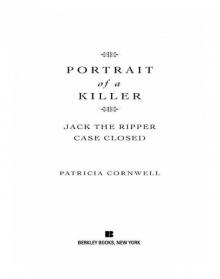 Portrait of a Killer: Jack the Ripper - Case Closed
Portrait of a Killer: Jack the Ripper - Case Closed Spin (Captain Chase)
Spin (Captain Chase)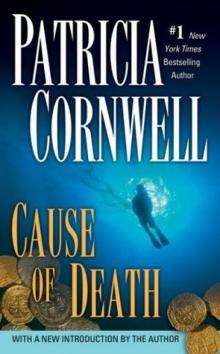 Cause of Death
Cause of Death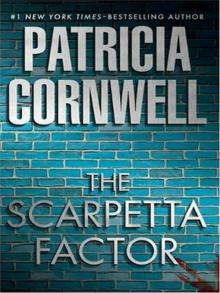 The Scarpetta Factor
The Scarpetta Factor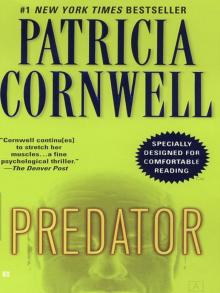 Predator
Predator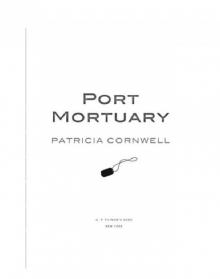 Scarpetta 18 - Port Mortuary
Scarpetta 18 - Port Mortuary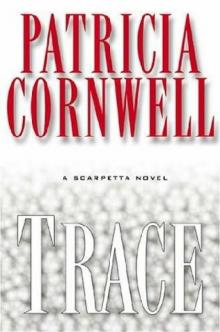 Trace ks-13
Trace ks-13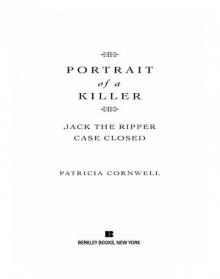 Portrait of a Killer
Portrait of a Killer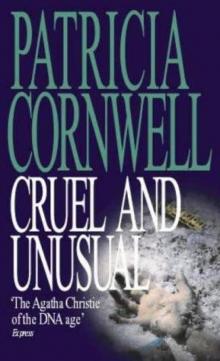 Cruel and Unusual ks-4
Cruel and Unusual ks-4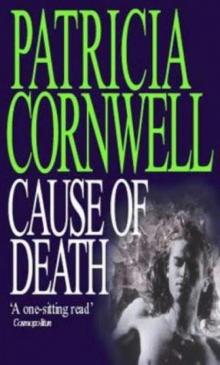 Cause Of Death ks-7
Cause Of Death ks-7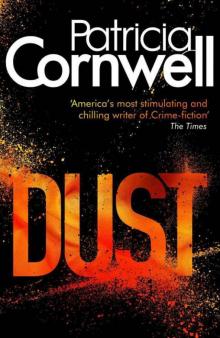 Dust ks-21
Dust ks-21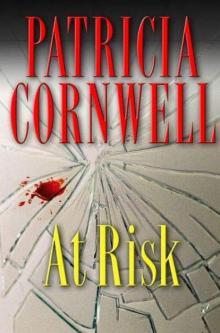 At Risk wg-1
At Risk wg-1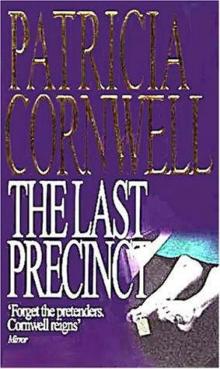 The Last Precinct ks-11
The Last Precinct ks-11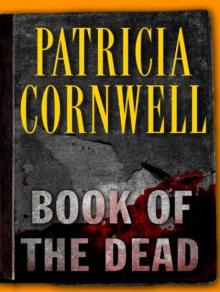 Book of the Dead ks-15
Book of the Dead ks-15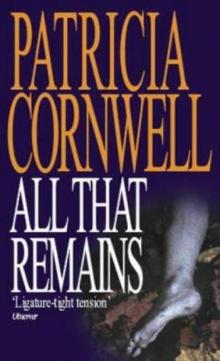 All That Remains ks-3
All That Remains ks-3 Ruth, a Portrait
Ruth, a Portrait Scarpetta's Winter Table (kay scarpetta)
Scarpetta's Winter Table (kay scarpetta) From Potter's Field ks-6
From Potter's Field ks-6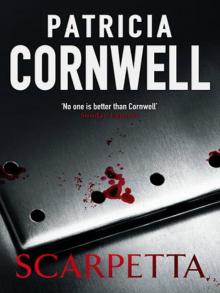 Scarpetta
Scarpetta Isle of Dogs jhabavw-3
Isle of Dogs jhabavw-3 Hornet's Nest jhabavw-1
Hornet's Nest jhabavw-1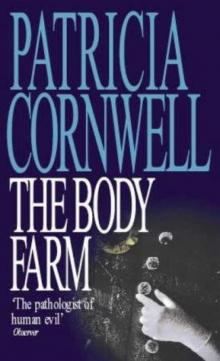 The Body Farm ks-5
The Body Farm ks-5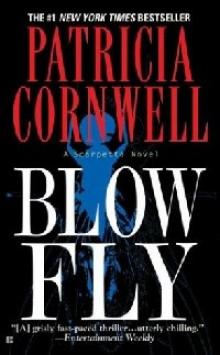 Blow Fly ks-12
Blow Fly ks-12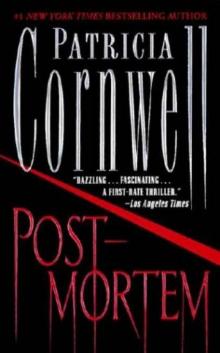 Post Mortem
Post Mortem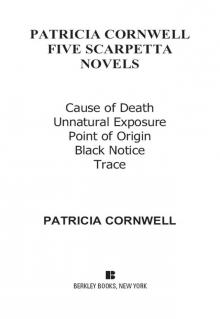 Five Scarpetta Novels
Five Scarpetta Novels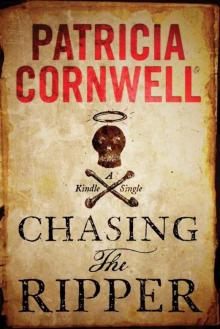 Chasing the Ripper (Kindle Single)
Chasing the Ripper (Kindle Single) Point of Origin ks-9
Point of Origin ks-9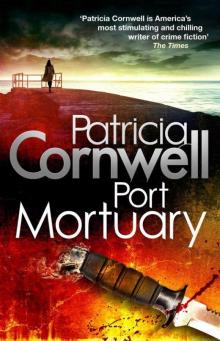 Port Mortuary (2010)
Port Mortuary (2010)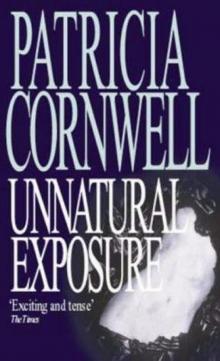 Unnatural Exposure ks-8
Unnatural Exposure ks-8 Southern Cross uhabavw-2
Southern Cross uhabavw-2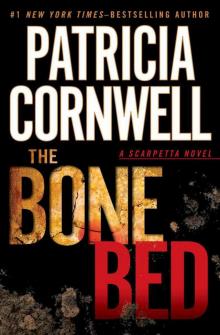 The Bone Bed ks-20
The Bone Bed ks-20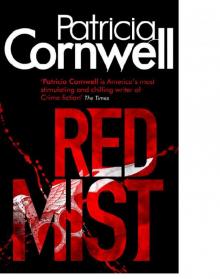 Red Mist ks-19
Red Mist ks-19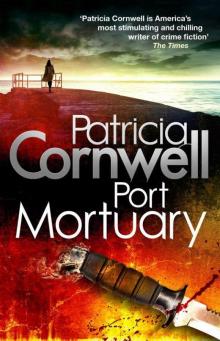 Port Mortuary (2010) ks-18
Port Mortuary (2010) ks-18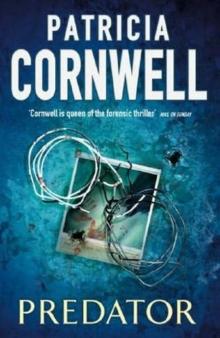 Predator ks-14
Predator ks-14